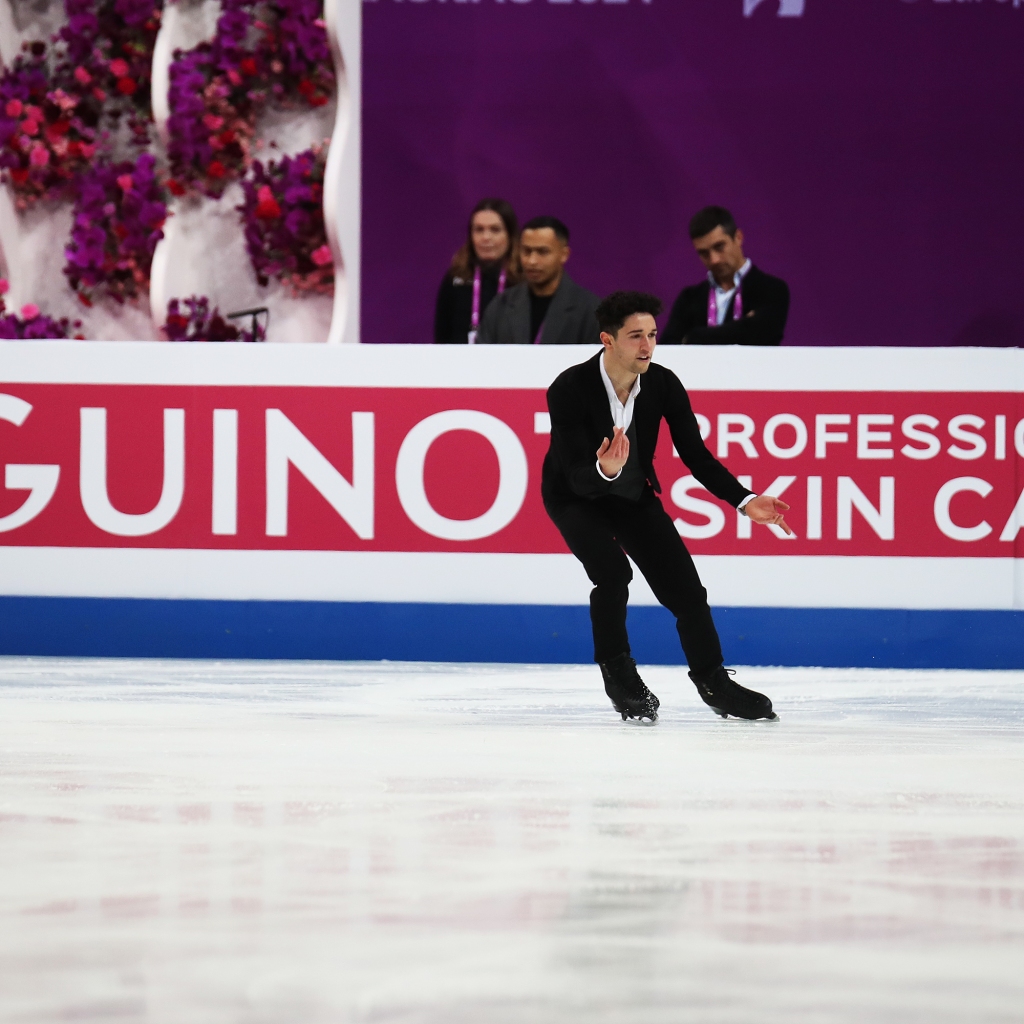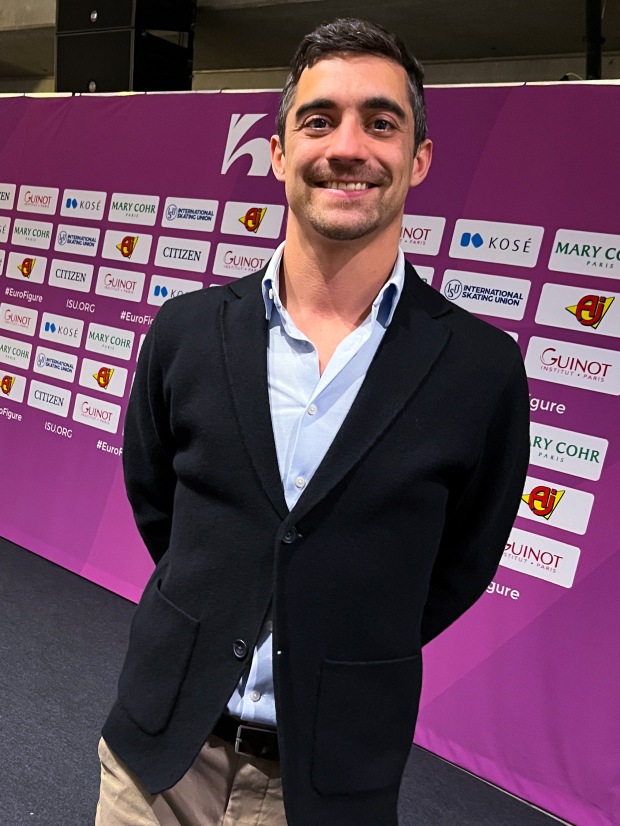By Hiro Yoshida
It has been five years since Javier Fernández retired from competitive skating after a pioneering and illustrious career. While he is no longer winning titles and medals for his native Spain, the seven-time European champion is still very much involved in the sport.
I caught up with Fernández at the European Championships in Kaunas, Lithuania where he was part of the team coaching French skater Luc Economides, alongside former rival and 2011 European champion Florent Amodio. This was his first time back at Europeans since his famous final victory in Minsk, Belarus back in 2019. The experience was not quite the same standing on the other side of the boards although he is quite content in his new role.
“Well, it’s different,” he explained. “It’s a different kind of pressure because at the moment of the competition, you can’t do anything anymore. It’s not like being in training where you can stop and you can review and you can talk and you can fix. It is difficult in that part. But when you’re a skater and you are on the ice, you are the one that has the most pressure. You are the one that has to skate. You’re the one that has to do good. It’s not always possible.”
It was the debut Europeans for Economides and the Frenchman had a strong showing in the short programme finishing seventh. However, a rough free skating dropped him down to 15th place in the final standings. Fernández was pleased overall with how Economides skated at the championships and believes that there is more to come once he gains some more high-level competition experience.
“He’s a very good performer,” Fernández said. “I think he did a great job and he improved a lot. Now we’ll have to focus a little bit more on the pressure because he is very consistent on the jumps in practice. He almost never misses any jumps. Of course, when you’re in competition, you’re nervous sometimes. The nerves get you a little stuck and sometimes those mistakes can happen.”

Following his retirement, Fernández launched his own coaching school called the Javier Fernandez Academy through which he organises and runs camps and seminars. He also has recently been choreographing for Economides.
“Florent and me, we work a lot in my academy and I also go help him in his academy,” Fernández explained. “That’s why we’ve been working together the past three years. I’ve been working with Luc and this year I helped him also with the choreography.
“He came with the idea of Chaplin, him and Florent. The programme was half done during the summer. Florent asked me if I could help him a little bit to create the rest of the programme.”
While Fernández acknowledges the development of the technical aspect of men’s figure skating, through his work as a choreographer he is hoping to see the current crop of skaters bring out their artistic side to the forefront.
“That’s something we’re trying to a little bit change,” he said. “We need to find a way to get the athletes, the skaters a little bit more into that art, the style, the skating, the interpretation, the musicality, that kind of art where we’ll forget a little bit more about the jumps. They’re also very important, but we can have what we used to have before. Me, Florent, Tomas Verner, Brian Joubert and Stephane Lambiel – all of us had a different kind of thing instead of just skating every year to the same thing. It was always a surprise. I can tell you half of the skaters what they’re going to skate next year. I can tell you. Not exactly the music, but the style I can tell you.”
Since his retirement, Spanish skating has not quite reached the same worldly heights. Fernández believes that there needs to be more work done not just in Spain, but in other countries that want to raise the standard of skaters their domestic systems produce. He knows from his own experience that the talent is there and it is how you nurture it.
“One of the problems is that in some countries we don’t have good development from the beginning,” he said. “We don’t have a training centre. We don’t have something that you can create from the beginning and I think that’s the first step. That’s why some countries, they bring skaters every year and when one finishes, there is another one because they have so many good schools. Some countries it is more tough because there are just normal clubs, normal skaters, coaches, so it’s more complicated. I think we have to improve that in some countries and we will have more success with the skaters and with the athletes. Definitely, there are always some talented skaters or some little sparks that appear. Most of the time, they have to leave. They have to go somewhere else. After all this history that we had, which is not very long, we have great skaters in Spain. Right now, for example, in Mexico, they have. I work a lot in Mexico. They have Donovan (Carrillo) and he’s doing great.
“Sometimes it’s not only the part of the skaters and the coaches,” Fernández continued. “We cannot create big things on our own. Sometimes the federations spend a lot of money helping the skaters training somewhere else, instead of spending the money in creating a centre where they can be training at home in a good atmosphere, in a good training centre. I think to get there, there needs to be more people involved. If you decide to go somewhere else, it’s your own decision. But it doesn’t have to be obligatory almost to go somewhere else.”
Fernández still performs from time to time in shows across the world. In 2018 and 2019, he produced his own ice show Revolution On Ice that performed to sellout audiences around Spain. He is considering doing more shows at home, but on a smaller scale.
“Maybe we do a different kind of show that is like Revolution, but a smaller version,” he said. “Not that big because we found doing a show that big is a lot of risk. It’s a lot of money. We’re going to try to find a different way of doing a show in Spain, where people can enjoy figure skating, but maybe in a smaller venue or with a smaller cast.”
Fernández is still a household name in Spain with an award-winning three-part documentary about his storied career airing on Spanish television. Last autumn he also surprisingly took part in Gran Hermano VIP, the Spanish version of Celebrity Big Brother.
“That was definitely not my thing,” he admitted. “It was tough inside the house, and not being able to rest, not eating well, not having anything to entertain yourself, everyone just screaming at each other every day is not my way. Not my style. I stayed almost seven weeks inside the house and it was a lot.”
Fernández now has his eyes firmly focused on skating. Following the European Championships, it was confirmed in early February by the Fédération Française des Sports de Glace that Economides would represent France at this month’s World Championships in Montreal, Canada. Fernández sees the fight for the medals at Worlds coming down to skaters from outside Europe.
“I might be so wrong and I’m so bad with these things, but my prediction is that it will be Shoma (Uno), Ilia (Malinin) and Yuma (Kagiyama),” he said. “Shoma is the most experienced boy, and I think he is the one that will be more consistent. Second, Ilia because he’s been training and competing very well, but he still doesn’t have the same quality of skating as Shoma, but Shoma is still very strong in jumps. And Yuma because he’s very complete. I like how he skates. I like how he jumps. He’s very elegant. That’s my prediction.”
Fernández has been there and done as a competitor that with two World and seven European titles in his collection. However, there is one medal that is clearly the most precious of all to him.
“Right now, they’re in a box because I just moved from an apartment to a house,” he said. “Only the Olympic medal is not in the box.”
